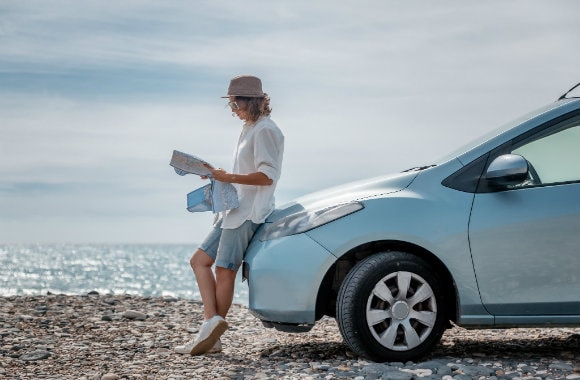What You Need To Know Before You Rent A Car

If you’ve never hired a car before, the process can seem a bit daunting. There is a lot of information to take in, and the rules can be different depending on which car rental company you have hired a vehicle with. We’ve asked some of the VroomVroomVroom team members to share their advice for first-time renters.
“Prepare for the unexpected – consider purchasing Rental Vehicle Excess Insurance”
Andrew Maister – General Manager

Rental cars often have an excess amount that a customer is liable to pay if any damage is caused to the vehicle while it is in their possession. In Australia, this can range from $4,000 to $6,000. You can reduce your financial liability by purchasing Rental Vehicle Excess Insurance. Car rental companies also offer their own excess reduction products.
“Don’t feel obligated to purchase extras from counter staff.”
Tia Hippolite – Customer Experience Manager

At the car rental depot, you’ll be offered a number of extras such as excess reduction, fuel and GPS devices. It’s important to educate yourself so that you understand what you need and make sure you don’t end up purchasing any unnecessary products.
“Beware of free upgrades.”
Jordan Hooper – Partnerships Manager

In some cases, car rental companies may offer you an upgrade at the desk. Before you accept, make sure you understand how much the extra taxes and fees will add to the total cost of your rental. A “free” upgrade could end up costing you more than you think.
“Book well in advance.”
Kim Butler – Customer Care Supervisor

Car rental prices fluctuate based on availability. If you leave it until the last minute to book a rental car, the prices may be higher. During busy holiday periods, you may find that vehicles are booked out.
“Make sure you purchase Loss Damage Waiver”
James Swiney – Mobile Developer

If you’re visiting the United States, car rental insurance works slightly differently. If you purchase Loss Damage Waiver you can limit your financial responsibility. Without any insurance, you could be liable for the full cost of the car.
“Re-fill the fuel tank before you return the car.”
Hieu Vu – Head of Product and Development

When you rent a car, it will be provided to you with a full tank of fuel. If you return the car without completely filling the tank, you could face additional charges. In some cases, you do have the option to pre-purchase the tank of fuel to avoid stopping at a petrol station.
“Check the car for existing damage.”
Claire Boyd – Project Director

It is a good idea to take photos or record footage of the car when you collect it. If any extra damage is found at the end of the rental period that was not previously listed on the report you could be charged.
“Understand what ‘or similar’ means.”
Julia Raczko – Social & Community Team Leader

When you book a Mitsubishi ASX, it doesn’t necessarily mean you will get a Mitsubishi ASX. Car rental companies do not guarantee a specific car model, so you will be given a vehicle in the same category as the one you have requested.
“Remember that bookings are charged in 24 hour periods.”
Abi Develing – Personal Assistant

Car rental bookings are charged in 24-hour periods. This means even if you keep your car an extra hour, you could be charged for a full extra day.
“The total charges are always more than you might expect.”
Karen Hansen – Commercial Lead

By the time you add on any necessary extras, you may find the final price is higher than you expected. Additionally, you will need to leave a security bond. You won’t have access to these funds during the rental period.
“It may be cheaper to hire a car.”
Jorg Roper – Dev Ops

Don’t assume that travelling by plane, bus or train will be cheaper than a rental car. Particularly if you are travelling in a group, often hiring a car works out to be the more cost-efficient options. You can also save money by picking up your car in an outer suburb and avoiding popular downtown and airport locations.
“Make sure you bring the right documents with you.”
Jessica Hann – Content Writer

When you hire a car, you may need to take more than just your driver’s licence and credit card to the depot. In some cases, you may also need to show your passport or a utility bill showing your current address. Some car rental companies also request a copy of travel documentation (such as a flight itinerary).
A few extra tips
- Make sure you thoroughly read the terms and conditions. They detail important information about travel restrictions that may apply to your rental. For example, you may not be permitted to take your car on a ferry or above the snow line.
- Read the description of the car on VroomVroomVroom to learn how many passengers the vehicle seats, and how much storage space there is.
- Save money renting a GPS by downloading maps onto your phone.
- Make sure you check with any hotels you are staying at whether they include parking. In some cases, you’ll need to let them know beforehand if you are bringing a car.
- Check the cost of one-way fees – sometimes these can be quite expensive.

